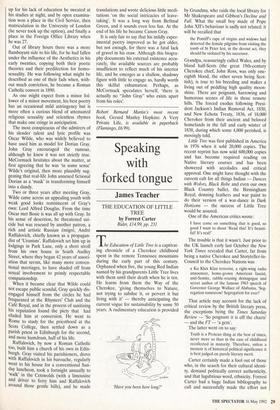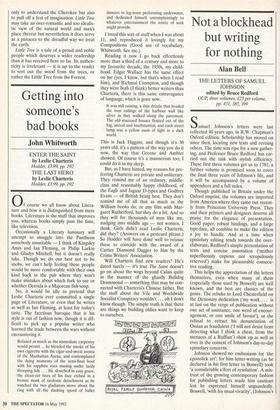Speaking with forked tongue
James Teacher
THE EDUCATION OF LITTLE TREE by Forrest Carter Rider, £14.99, pp. 231 he Education of Little Tree is a captivat- ing chronicle of a Cherokee childhood spent in the remote Tennessee mountains during the early part of this century. Orphaned when five, the young Red Indian named by his grandparents Little Tree lives with them until their death when he is ten. He learns from them the Way of the Cherokee, 'giving themselves to Nature, not trying to subdue it, or pervert it but living with it' — thereby anticipating the current vogue for sustainability by some 50 years. A rudimentary education is provided
'Have you been here long?' by Grandma, who raids the local library for Mr Shakespeare and Gibbon's Decline and Fall. What the small boy made of Pope John XII's behaviour is sadly not related: it will be recalled that
the Pontiff's rape of virgins and widows had deterred the female pilgrims from visiting the tomb of St Peter lest, in the devout act, they should be violated by his successor.
Grandpa, reassuringly called Wales, and by blood half-Scots (the great 19th-century Cherokee chief, John Ross, was only one- eighth blood, the other seven being Scot- tish), is true to his breeding and makes a living out of peddling high quality moon- shine. There are poignant, harrowing and humorous scenes of life in those remote hills. The forced exodus following Presi- dent Jackson's Indian Re,moval Act, 1830, and New Echota Treaty, '1836, of 18,000 Cherokee from their ancient and beloved homelands in the fall and early winter of 1838, during which some 4,000 perished, is movingly told.
Little Tree was first published in America in 1976 when it sold 20,000 copies. The recent reprint has now sold 600,000 copies and has become required reading on Native literary courses and has been showered with accolades and critical approval. One might have thought with the current cult for all things Indian — Dances with Wolves, Black Robe and even our own Black Country ballet, the Birmingham Royal, donning feathers and war paint to do their version of a war-dance in Dark Horizons — the success of Little Tree would be assured.
One of the American critics wrote:
I have come on something that is good, so good I want to shout 'Read this! It's beauti- ful! It's real!'
The trouble is that it wasn't. Just prior to the UK launch early last October the New York Times revealed that Carter, far from being a native Cherokee and Storyteller-in- Council to the Cherokee Nations was
a Ku Klux Klan terrorist, a right-wing radio announcer, home-grown American fascist, anti-Semite, rabble-rousing demagogue and secret author of the famous 1963 speech of Governor George Wallace of Alabama, 'Seg- regation tomorrow! Segregation for ever!'
That article may account for the lack of critical review by the British literary press, the exceptions being the Times Saturday Review — 'So poignant it is off the charts' — and the Fr— 'a gem'.
The latter went on to say:
Truth is a Protean thing at the best of times, never more so than in the case of childhood recollected in maturity. Therefore, unless a memoir is of historical political significance it is best judged on purely literary merit.
Carter certainly made a fool out of those who, in the search for their cultural identi- ty, demand politically correct authenticity, and that lugubrious word, ethnicity. Forrest Carter had a huge Indian bibliography to cull and successfully made the effort not
only to understand the Cherokee but also to pull off a feat of imagination. Little Tree may take an over-romantic and too idealis- tic view of the natural world and man's place therein but nevertheless it does serve as a panacea to the dreadful way we treat the earth.
Little Tree is a tale of a proud and noble people which deserves a wider readership than it has received here so far. Its authen- ticity is irrelevant — it is up to the reader to sort out the wood from the trees, or rather the Little Tree from the Forrest.



















































 Previous page
Previous page